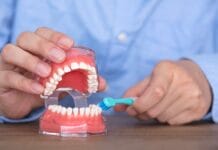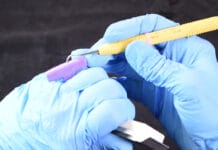As dental professionals know, dietary supplements are continually becoming more popular for consumers of all ages. From memory support and sleep aids to skincare and fitness, supplements range in uses and potential benefits. But how well are these supplements really working, and how does one really know if the supplement is effective and safe?
The National Institutes of Health (NIH) explains that knowledge about uses and ingredients in supplements varies greatly. Supplements are intended to be taken in addition to a balanced diet and, by definition, contain ingredients such as vitamins, minerals, herbs, botanicals, amino acids, enzymes, organ or gland tissues, or extractions of the previously listed. They can be created from plants, algae, fungi, or a combination of the three and are generally distributed in the forms of tablets, capsules, teas, and powders.6
Supplements are Less Regulated
Regulations for dietary supplements require companies to provide evidence that their products are safe and that their marketing labels are “truthful and not misleading.” Though these regulations are set, rules for supplement manufacturers are much less strict than those for prescription and over-the-counter medications.
The FDA also does not ensure safety or effectiveness before supplements are marketed, although they do have the authority to review products and those comments provided by consumers. If a product has been evaluated as unsafe, legal action can be taken, and the company may be warned about the problem, or the product can be pulled from manufacturing.6
The NIH reminds consumers that some supplements can be found suitable for your health. Many products, however, have not been proven to provide any true benefit. Consumers should identify valid evidence of effectiveness before taking any dietary supplements and always consult with their physician prior to starting any medication or supplement.6
Awareness of Supplements
Because of the potential lack of safety in some products as well as consumers taking supplements without supervision of a medical professional, dietary supplements result in an estimated 23,000 ER visits annually, often from young adults taking weight loss or energy supplements or older adults taking large tablets or capsules that result in problems with swallowing.6
Due to safety concerns and the high percentage of dental patients taking supplements, dental hygienists should be knowledgeable of common uses, side effects, and potential interactions of supplement use, as well as have an understanding of vitamin and mineral deficiency.
In one study that evaluated a sample of hygienists in the United States, it was determined that “Dental hygienists have low levels of knowledge and confidence about herbal and dietary supplements, as well as poor communication practices related to herbal and dietary supplements.”3 This was identified through a personal evaluation survey. It was also found that those hygienists who had attended a continuing education course within the last year or had personally used herbal and dietary supplements scored significantly higher in the three criteria (knowledge, confidence, and communication) that were identified as “significant predictors for higher knowledge about herbal and dietary supplements.”3
Water-soluble Vitamins
Oral health professionals who are seeking to gain more knowledge about supplement usage may find it valuable to begin learning about the vitamins that have been found to aid in periodontal disease prevention and healing. These include vitamins A, C, D, E, and the B complex vitamins.4 First, it is advantageous to know which vitamins are fat or water-soluble as this will identify if the vitamin is needed daily (water-soluble) or if the compound will be stored in the fat and is available for future use (fat-soluble).
Vitamin C and the B complex vitamins are all water-soluble. This makes the vitamins easily dissolvable in water, usable by the body by the method of absorption into the tissues. Because of their water solubility, an excess of water in the body’s system leads the vitamins to be excreted through urination. Toxicity is rare due to easy elimination.1
Vitamin C, also known as ascorbic acid, should be consumed to a level of 90 mg for men and 75 mg for women daily. Because of its antioxidant properties, vitamin C works against oxidants that cause tissue damage.4 It has been found in a study that low vitamin C plasma levels are characteristic of those diagnosed with periodontitis, especially periodontally involved patients who are also smokers. Using grapefruit as a vitamin C source, the vitamin C plasma levels of the test subjects increased, and the sulcular bleeding scores were reduced.7
Eight vitamins make up the B complex vitamins, including thiamine (B1), riboflavin (B2), niacin (B3), pantothenic acid (B4), pyridoxine (B6), biotin (B7), folic acid (B9), and cobalamin (B12). The American Dental Hygienists’ Association has deemed B vitamins as important for oral health as these compounds are essential for bodily growth and development, blood health, and the preservation of periodontal structures.5
Recommended daily intake of the B vitamins are as follows:
B1 ‒ 1.2 mg for men, 1.1 mg for women
B2 ‒ 1.3 mg for men, 1.1 mg for women
B3 ‒ 16 mg for men, 14 mg for women
B5 ‒ 5 mg for men and women
B6 ‒ 1.3 mg for men and women
B7 ‒ 30 mcg for men and women
B9 ‒ 400 mcg for men and women
B12 ‒ 2.4 mcg for men and women4
Fat-soluble Vitamins
In comparison, vitamins A, D, and E are fat-soluble and are able to be stored in the liver and fatty tissues of the body, making the compounds available for future use. Because these vitamins are found in the highest levels of high-fat foods, it is known that they are better absorbed if consumed with fat. Due to the vitamin’s ability to be stored in the body, toxicity is more prevalent.1
Vitamin A is an antioxidant that works to build and maintain tissues such as mucous membranes and epithelial tissues. Vitamin A also assists the body in the proper differentiation of cells, including immune cells involved in the immune system response that results in periodontal disease. It has been found in past research, according to Rugg-Gunn et al., that vitamin A deficiency can be linked to increased periodontal infection. Recommended daily intake of vitamin A is 10,000 IU.5
Vitamin D, which is also called calciferol, should be consumed to a level of 600 IU daily. Known for assisting in bone health, vitamin D works to aid in intestinal absorption of calcium and phosphorus. Additionally, vitamin D can aid in immune function and the reduction of inflammation. Bone loss and increased inflammation often result from vitamin D deficiency. Because of this, vitamin D has been shown to aid in the treatment of periodontal disease.5
Lastly, Vitamin E also works to reduce inflammation, which can help in the reduction and control of periodontal infection. This vitamin also has antioxidant properties and prevents cell damage by blocking free radical activity that harms periodontal structures. Recommended daily intake of vitamin E is 22.4 IU.5
Numerous other vitamins and minerals are also available, of course, as well as other components found in dietary supplements. But having an understanding of these periodontally concerned vitamins is a great place to start. Knowing how to find trusted sources of research as well as supplement manufacturers and gaining interprofessional relationships with other health care providers is a great step in assisting our patients in providing education and resources during their care.
Interactions with Other Drugs
Oral health providers should also take into consideration the potential drug interactions that many supplements and common prescription drugs can have. One especially important interaction to be knowledgeable about is with patients taking anticoagulants such as warfarin. Many supplements including cranberry, fish oil, garlic, ginkgo, ginseng, St. John’s wort, and vitamin E can affect the anticoagulant drug’s effectiveness and can, depending on the supplement, can increase or decrease the patient’s international normalized ratio (INR), which determines the patient’s prothrombin time.2
Many psychiatric medications can also have interactions with supplements, including ginkgo, ginseng, and St. John’s wort. Symptoms such as headaches, drowsiness, decreased serum levels, manic-like symptoms, possible coma, and other interactions can occur with the combination of these supplements and some psychiatric drugs.
Many other drug classes and supplements can cause adverse effects and interactions. Oral providers should be diligent in asking patients about their prescriptions, over-the-counter, and supplement usage to avoid not only in-office medical emergencies but also long-term adverse effects for the patient.2
Oral health providers at all levels should work together with the overseeing dentist, and the patient’s health care provider and/or registered dietitian when providing recommendations on the use of dietary supplements. Oral health providers should also be aware of what patients are currently taking, whether prescribed or not, to ensure patient safety and prevention of potentially life-threatening complications from interactions.
As dental professionals, we are often in a unique position where identification of deficiency may be present. This makes collaboration with other professionals, with the use of gathered clinical evidence, beneficial in the determination of a patient’s potential need for supplement use. Knowing the benefits of and signs of deficiency for necessary vitamins and minerals can help to avoid or treat periodontal disease as well as other health conditions.
Need CE? Check Out the Self-Study CE Courses from Today’s RDH!
Listen to the Today’s RDH Dental Hygiene Podcast Below:
References
- Alma, L. (2021, Aug 19). Fat-soluble vs. Water-soluble Vitamins. Retrieved from https://www.verywellhealth.com/fat-vs-water-soluble-998218
- Gardiner, P., Phillips, R., Shaughnessy, A. Herbal and Dietary Supplement-drug Interactions in Patients with Chronic Illnesses. Am Fam Physician. 2008 Jan 1; 77(1):73-78.
- Hurlbutt, M., Bray, K., Mitchell, T.V., Stephens, J. California Dental Hygienists’ Knowledge, Attitudes and Practices Regarding Herbal and Dietary Supplements. Journal of Dental Hygiene. 2011; 85(4). 285-296. Retrieved from https://www.proquest.com/scholarly-journals/california-dental-hygienists-knowledge-attitudes/docview/920366850/se-2?accountid=12259
- Kubala, J. (2018, June 7). B-complex Vitamins: Benefits, Side Effects and Dosage. Healthline. Retrieved from https://www.healthline.com/nutrition/vitamin-b-complex
- Macaluso, M., Mariano, L. Vitamins as an Adjunct to Traditional Periodontal Therapy. Access. 2014 Feb; 28(2): 14–16. Retrieved from https://adha.cdeworld.com/courses/20176-vitamins-as-an-adjunct-to-traditional-periodontal-therapy
- Using Dietary Supplements Wisely. (2021). NIH: National Center for Complementary and Integrative Health. Retrieved from https://www.nccih.nih.gov/health/using-dietary-supplements-wisely
- Staudte, H., Sigusch, B.W., Glockmann, E. Grapefruit Consumption Improves Vitamin C Status in Periodontitis Patients. Br Dent J. 2005 Aug 27; 199(4):213-7, discussion 210. doi: 10.1038/sj.bdj.4812613. PMID: 16127404.












